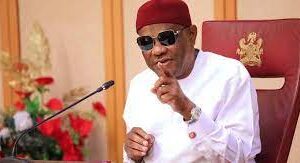Corruption is an issue Nigerians love to discuss with passion because it is believed to be the crux of the country’s under development. It is an issue that many often discuss with sentiment, palpable frustration and anger over the seeming inability of successive governments to eradicate. On such occasions, the political leadership, government functionaries and public institutions charged with the anti-corruption war are always at the receiving end of the public display of disappointment.
Such was the case recently, when a statement credited to the Chairman of the Independent Corrupt Practices and Other Related Offences Commission (ICPC), Chief Ekpo Nta, that stealing is erroneously reported as corruption drew scathing criticism from some members of the public. He had, during the visit of a delegation of the Council for the Regulation of Engineering in Nigeria to the Commission, observed that Nigerians needed more understanding of the various dimensions of corruption in order for all to be able to tackle it effectively. He explained, for example, that stealing is erroneously reported as corruption.
His observation apparently hit the wrong chord in the hearts of some people who reacted with severe criticism, suggesting that he was probably not committed to the war against corruption. Some, including a section of the media, went to the extent of calling on him to step down, arguing that his statement portrayed him as a tool in the hands of the political authorities whom they accused of not showing the required seriousness to effectively address the menace of corruption.
However, there are some who believe that the furious shooting of diatribe by the critics at the chairman over a harmless and sincere observation that merely pointed attention to the obvious but often ignored misrepresentation, was unnecessary, particularly after the clarification issued by the Commission to shed more light on the statement. The Commission had explained that stealing is corruption if it involves a public officer abusing his office for private gains as provided in sections 16 and 19 of the ICPC Act while stealing or theft as defined by criminal code and penal code falls within the police powers to investigate and prosecute.
This clarification can hardly be faulted. From the legal and constitutional perspective, stealing is recognised in the statute books of every country as a criminal act whether it is committed in or outside the public service. It has prescribed punishment in the relevant criminal and penal codes. Even private business concerns and corporations have rules for dealing with stealing or theft, in their establishments, which may include recovery of the stolen items and dismissal of the culprit with or without prosecution.
The purge of the public service during the Murtala Muhammed military regime which sanctioned both the military political office holders and civil servants deemed to have corruptly enriched themselves and the arrest and prosecution of political office holders of the second republic by the Buhari/ Idiagbon regime, for misappropriation of funds and corrupt enrichment, were seen by the people as stealing of government money. So is the current effort by the administration of President Jonathan to prosecute public officers indicted in the pension fund scandal and others. To many
Nigerians, the offences of corrupt enrichment, misappropriation of funds and cases of fraud involving money all mean stealing.
What the ICPC chairman said in that statement, which appeared to have been clearly misinterpreted and misunderstood by his critics, is that a lot of Nigerians are yet to understand that corruption comes in various forms and dimensions. It is not about embezzlement of public funds alone and certainly not about general theft in and around the society, which is within the jurisdiction of the police. It is also about those actions we take or witness that compromise the socio-economic well-being of the nation, the welfare of our fellow citizens and our own future.
How many Nigerians, for example, have reported bribery in public and private offices or reported suspicion of a case of illicit enrichment in their neighbourhood? The anti-corruption war is a structured war with a clear mandate and roles for both the anti-corruption agencies and the citizenry. It is important for the citizenry to understand this clearly and not hold the agencies to responsibilities outside their mandate.
The ICPC chairman has raised a very important point in the anti-corruption war. The people must understand the war and how to support it. The Commission may need to design a public education initiative in this direction in addition to its existing advocacy programmes.
By Ezekiel Babalola,
Surulere, Lagos




